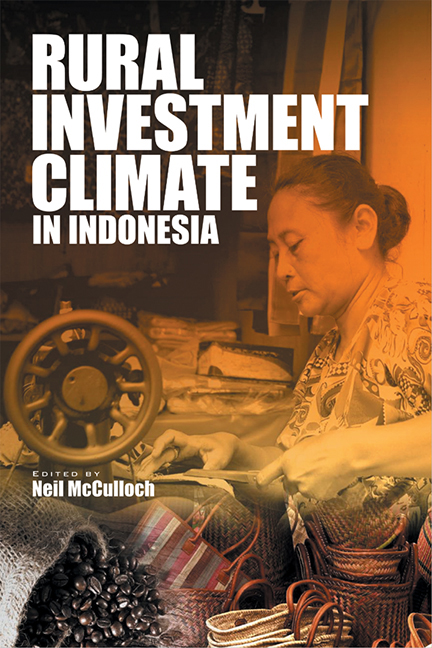Book contents
- Frontmatter
- Contents
- List of Tables, Figures, and Boxes
- Abbreviations and Acronyms
- The Contributors
- 1 Introduction
- 2 Agricultural Demand Linkages and Growth Multipliers in Rural Indonesia
- 3 Trends and Constraints Associated with Labour Faced by Non-Farm Enterprises
- 4 The Constraints in Accessing Credit Faced by Rural Non-Farm Enterprises
- 5 The Constraints Associated with Infrastructure Faced by Non-Farm Enterprises at the Kabupaten Level
- 6 Technology/Knowledge Transfer and Diffusion in Indonesian Non-Farm Enterprises
- 7 Marketing and Competition in the New Indonesia
- 8 Local Tax Effects on the Business Climate
- 9 Leadership and Voice in Local Governance
- 10 Insecurity and Business Development in Rural Indonesia
- Index
3 - Trends and Constraints Associated with Labour Faced by Non-Farm Enterprises
Published online by Cambridge University Press: 21 October 2015
- Frontmatter
- Contents
- List of Tables, Figures, and Boxes
- Abbreviations and Acronyms
- The Contributors
- 1 Introduction
- 2 Agricultural Demand Linkages and Growth Multipliers in Rural Indonesia
- 3 Trends and Constraints Associated with Labour Faced by Non-Farm Enterprises
- 4 The Constraints in Accessing Credit Faced by Rural Non-Farm Enterprises
- 5 The Constraints Associated with Infrastructure Faced by Non-Farm Enterprises at the Kabupaten Level
- 6 Technology/Knowledge Transfer and Diffusion in Indonesian Non-Farm Enterprises
- 7 Marketing and Competition in the New Indonesia
- 8 Local Tax Effects on the Business Climate
- 9 Leadership and Voice in Local Governance
- 10 Insecurity and Business Development in Rural Indonesia
- Index
Summary
Introduction
This chapter examines trends in non-farm employment and associated labour market constraints that have hindered the growth of non-farm employment (NFE) since the economic crisis in 1997–98. Declining rural NFE is of particular concern as it is related to stagnant or even declining investment and output growth. This chapter also examines the human capital dimension of labour markets, key labour regulations and migration that are thought to hinder, or encourage, NFE creation.
The chapter is organized as follows: the second part of the chapter looks at NFE trends in urban and rural areas, by sector, according to formal and informal work status, and by type of employment. In the third part, a brief literature survey deals with labour market-related aspects of NFE. Evidence for Indonesia on labour market aspects of NFE is presented in part four, by estimating a model of NFE probabilities. This is followed by an examination of labour regulations and their effects on NFE creation. A discussion of migration as it relates to NFE follows. The last part concludes with a brief look at policy implications.
Trends in Non-Agricultural and Non-Farm Employment
Rapid economic growth before the crisis created opportunities for households from a range of classes to become involved in a range of service and sales activities stimulated by the new prosperity, particularly in rural Java (Effendi and Manning 1994, pp. 233–36).
However, during the crisis and recovery in Indonesia in 1997–2000, the rural non-farm sector experienced a major downturn. The Indonesian Family Life Surveys conducted in the pre-crisis period (1997) and in the post-crisis period (2000) show how people responded to the crisis: labour force participation rates rose; more women became involved in NFE; and in many areas both women and men diversified their earnings activities (Strauss et al. 2004). More women worked in self-employment and family workers rather than in formal employment. The following section describes several important trends in employment growth since the crisis.
The first trend is the apparent negative correlation between employment growth in agriculture and NFE (see Table 3.1). As the agriculture sector declined in importance, employment growth in the sector was negative for the ten years prior to the crisis. However, during the crisis and in its aftermath the agriculture sector absorbed large numbers of workers displaced from nonfarm jobs.
- Type
- Chapter
- Information
- Rural Investment Climate in Indonesia , pp. 50 - 85Publisher: ISEAS–Yusof Ishak InstitutePrint publication year: 2009



